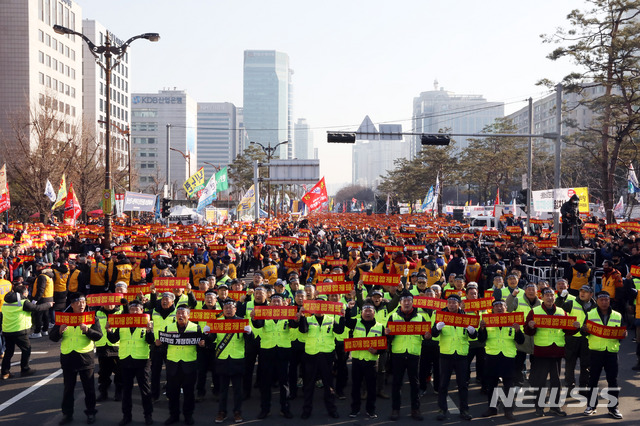List
Story > NEWS > Detail
[Seoul News] Is it a shared economy or a right to survive?
As the user's use of services changed after the smartphone revolution, things that we had not predicted were happening. One of them is the shared economy. However, the shared economy has become a controversial issue recently. This is due to carpool app service, which is one of the most common economies. This is because a transportation subsidiary of Kakao, which operates instant messenger Kakao Talk, has declared that it will launch a "capool service" similar to Uber in the near future.
Kakao had been preparing to release its car pool service in the near future as long as it only needs to recruit drivers. To explain the car pool service, a car pool service means a service that connects a private driver with the same destination or direction when a user enters his or her location and destination. Uber, which is currently serving overseas, is expected to offer the same type of car pool service at a lower cost than a taxi if it travels the same distance.

Against this backdrop, the taxi industry has been showing increasing resistance. This is because they think it will be a big blow to them if the cacao cap is implemented.
But I have a question here. Before this, there was a company called "plus," which is a carpool service, in Korea, but why is it so exciting to hear that Kakao Talk is suddenly carpooling? The reason is that a well-known company called Kakao wants to provide a service. Taxi drivers use nearly 100 percent of the cabs. So the taxi drivers are feeling how many people use the cacao to use it. That's why the protests took place because of the apprehension that everyone would use carpool services in Kakao.

Therefore, Kakao's cape has taken a step back and will not be released this year. However, this is nothing more than a brief suturing of the conflict. As such, carpool and taxi companies are in a fierce battle.
However, not only carpool but also other car-sharing economies are being released one after another. Until now, car-sharing services have been constantly tried in Korea. For example, VCNC, a subsidiary of Soka, which operates a car-sharing service, released a car-call service called Tada on October 8. The fare at VCNC is about 20 percent higher than that of taxis at the same distance, but it has adopted a "barrow vehicle" system that is equipped with the fastest-to-reach vehicle when a passenger calls. Against this backdrop, the taxi industry will continue to protest against this kind of car-sharing economy.

On the other hand, in the West, where vehicle sharing services are currently active, more than just sharing idle cars, and actively researching "taxi transportation services that do not require drivers" in conjunction with self-driving technology. Therefore, the debate over carpool services goes way against the trend in the global market.
So what is the government doing? Although there is a new wave in the industrial front, the government has yet to come up with proper countermeasures. It is not practical for both service providers and the taxi industry, which are advocating the right to survive, to come up with a compromise that is satisfactory. Academic circles are discussing ways to improve policies such as late-night surcharges, adjusting the time limit, introducing taxi rides, and strengthening incentives, but these options are not even discussed properly.
On the other hand, despite vehement opposition from the taxi industry, the public's eyes on them are relatively cold. According to an online survey of Doit Survey, 60 percent of all respondents have been denied a ride. The public is said to have experienced direct inconvenience in using taxis. So it can be seen that the taxi industry has to endure the cold eyes of the public in part because of the dissatisfaction with the services they provide.
Apple, Baidu, and other leading global ICT dinosaurs are actively researching and discussing the next generation of services beyond taxi and car sharing. Google's Weimo secured 62,000 robotic taxis in June. If the controversy over carpool services is not over soon, Korea's transportation services will not be able to get on the global trend. For the sake of the next generation, I hope to get over the current carpooling controversy as soon as possible and discuss the services of the next generation.
As the user's use of services changed after the smartphone revolution, things that we had not predicted were happening. One of them is the shared economy. However, the shared economy has become a controversial issue recently. This is due to carpool app service, which is one of the most common economies. This is because a transportation subsidiary of Kakao, which operates instant messenger Kakao Talk, has declared that it will launch a "capool service" similar to Uber in the near future.
Kakao had been preparing to release its car pool service in the near future as long as it only needs to recruit drivers. To explain the car pool service, a car pool service means a service that connects a private driver with the same destination or direction when a user enters his or her location and destination. Uber, which is currently serving overseas, is expected to offer the same type of car pool service at a lower cost than a taxi if it travels the same distance.

Against this backdrop, the taxi industry has been showing increasing resistance. This is because they think it will be a big blow to them if the cacao cap is implemented.
But I have a question here. Before this, there was a company called "plus," which is a carpool service, in Korea, but why is it so exciting to hear that Kakao Talk is suddenly carpooling? The reason is that a well-known company called Kakao wants to provide a service. Taxi drivers use nearly 100 percent of the cabs. So the taxi drivers are feeling how many people use the cacao to use it. That's why the protests took place because of the apprehension that everyone would use carpool services in Kakao.

Therefore, Kakao's cape has taken a step back and will not be released this year. However, this is nothing more than a brief suturing of the conflict. As such, carpool and taxi companies are in a fierce battle.
However, not only carpool but also other car-sharing economies are being released one after another. Until now, car-sharing services have been constantly tried in Korea. For example, VCNC, a subsidiary of Soka, which operates a car-sharing service, released a car-call service called Tada on October 8. The fare at VCNC is about 20 percent higher than that of taxis at the same distance, but it has adopted a "barrow vehicle" system that is equipped with the fastest-to-reach vehicle when a passenger calls. Against this backdrop, the taxi industry will continue to protest against this kind of car-sharing economy.

On the other hand, in the West, where vehicle sharing services are currently active, more than just sharing idle cars, and actively researching "taxi transportation services that do not require drivers" in conjunction with self-driving technology. Therefore, the debate over carpool services goes way against the trend in the global market.
So what is the government doing? Although there is a new wave in the industrial front, the government has yet to come up with proper countermeasures. It is not practical for both service providers and the taxi industry, which are advocating the right to survive, to come up with a compromise that is satisfactory. Academic circles are discussing ways to improve policies such as late-night surcharges, adjusting the time limit, introducing taxi rides, and strengthening incentives, but these options are not even discussed properly.
On the other hand, despite vehement opposition from the taxi industry, the public's eyes on them are relatively cold. According to an online survey of Doit Survey, 60 percent of all respondents have been denied a ride. The public is said to have experienced direct inconvenience in using taxis. So it can be seen that the taxi industry has to endure the cold eyes of the public in part because of the dissatisfaction with the services they provide.
Apple, Baidu, and other leading global ICT dinosaurs are actively researching and discussing the next generation of services beyond taxi and car sharing. Google's Weimo secured 62,000 robotic taxis in June. If the controversy over carpool services is not over soon, Korea's transportation services will not be able to get on the global trend. For the sake of the next generation, I hope to get over the current carpooling controversy as soon as possible and discuss the services of the next generation.



